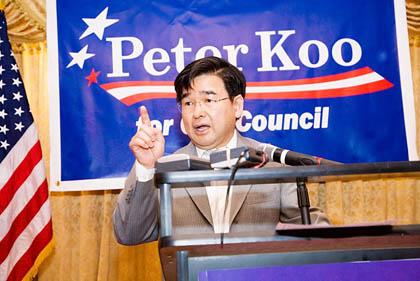
On Thursday, New York City Councilman Peter Koo of Flushing, Queens announced that he’s switched his party affiliation from Republican to Democrat. There are several reasons why he may have switched. Reports have surfaced that Koo had problems with the Queens County Republican Party. But more interestingly, some have speculated that Koo did it to increase his influence. As a Democrat, he could bring more city funds to his district. Moreover, he could serve as a mentor to young, up-and-coming Asian American political stars, who are largely Democrats.
Koo’s role as a highly influential senior statesman for APA politicos is important. This is especially true after recent reports that that New York City APAs are growing concerned about their political advancement following the fundraising scandal engulfing Comptroller John Liu, the current leading APA politician in New York.
For Koo, switching parties is a relatively risk-free proposition. It’s a lesson he learned in 2009 when he ran as a Republican. By running under the GOP banner, he was able to bypass the highly competitive Democratic Primary which included five candidates – four of them APAs. Then, in the general election, he beat his Democratic opponent with relative ease. (Koo also ran for the State Senate in 2008, but lost to the Democratic incumbent.)
So really, what are the downsides to Koo switching parties?
There are two drawbacks, but they shouldn’t really affect Koo. The first problem Koo may run into is that he might draw a Republican challenger during the next election. But if he had remained a Republican, he still would have drawn a challenger. Koo has more to fear from challengers coming from the left because Flushing has more registered Democrats. Besides, the 2009 Democratic Primary is proof of the large number of ambitious Democrats there are in Flushing.
The second problem is that Koo makes himself an easy target should he ever decide to run for higher office. His opponents may portray him as a flip-flopper who makes decisions based on political expediency. Republicans may use his previous positions against him in future general election campaigns. But Koo shouldn’t be worried. First, he’s unlikely to run for higher office. He’ll be 70 years old by the time term limits are up. Second, he’s already amassed a relatively moderate/liberal record as a city councilman.
It’s uncertain whether Koo ran as a Republican in 2009 just as a way to increase his chances at winning the seat. But now that he’s a councilman, it’s a smart political decision to switch parties. The downside is so limited but the upside is so great.








